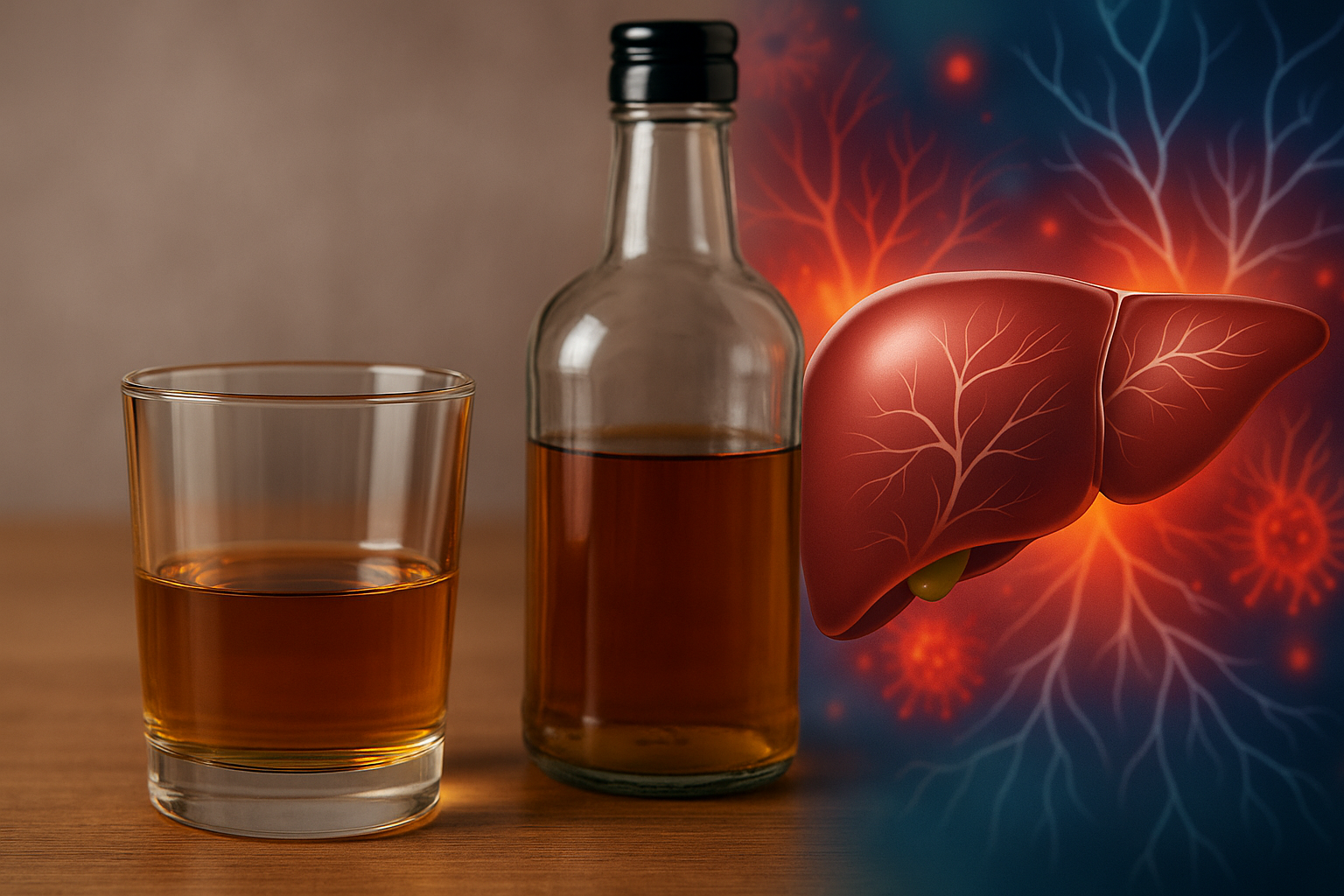Alcohol is one of the most commonly consumed substances worldwide, enjoyed socially and culturally for centuries. But as modern research continues to uncover the ways alcohol impacts the body, one critical question arises: Does alcohol cause inflammation?
The answer isn’t simple; it depends on the amount, frequency, and even the type of alcohol consumed. While small amounts may not trigger harmful effects in some individuals, excessive or long-term drinking is strongly linked to inflammation, which is at the root of many chronic diseases.
In this article, we’ll break down how alcohol affects inflammation in the body, what the latest science reveals, and practical steps you can take to reduce risks.
What Is Inflammation?
Before diving into alcohol’s role, it’s important to understand what inflammation actually is.
Inflammation is the body’s natural defense mechanism against injury, infection, or toxins. When you cut your finger, white blood cells rush to the site, causing redness, heat, and swelling. This is acute inflammation, a short-term, protective response.
However, when inflammation persists for months or years without a clear cause, it becomes chronic inflammation. Unlike acute inflammation, chronic inflammation is harmful and is associated with conditions like:
- Heart disease
- Liver disease
- Cancer
- Autoimmune disorders
- Type 2 diabetes
Now, let’s explore how alcohol plays into this.
Does Alcohol Cause Inflammation?
The Short Answer
Yes, alcohol can cause inflammation, especially when consumed in excess. Scientific studies consistently show that drinking too much alcohol increases inflammatory markers in the body.
However, moderate drinking may have a different effect, and individual factors like genetics, lifestyle, and existing health conditions also play a role.
How Alcohol Triggers Inflammation in the Body
1. Liver Stress
The liver is the primary organ responsible for metabolizing alcohol. When alcohol is broken down, it produces toxic byproducts such as acetaldehyde and free radicals. These substances can damage liver cells, leading to liver inflammation (hepatitis), fatty liver disease, or cirrhosis over time.
2. Gut Imbalance
Alcohol disrupts the gut microbiome—the community of bacteria in your digestive tract. A disrupted microbiome allows harmful bacteria to leak into the bloodstream, which sparks immune responses and systemic inflammation.
3. Immune System Activation
Alcohol directly alters the function of immune cells. It can increase the production of pro-inflammatory cytokines, signaling molecules that keep the body in a state of heightened immune response.
4. Oxidative Stress
Excessive alcohol consumption leads to oxidative stress, where harmful free radicals outweigh the body’s antioxidants. This imbalance damages cells and tissues, further fueling inflammation.

Caption: Excessive alcohol can stress the liver and trigger inflammation.
Evidence from Research
Several studies confirm the link between alcohol and inflammation:
- A 2015 study in the World Journal of Gastroenterology showed that chronic alcohol use leads to liver inflammation and increased risk of cirrhosis.
- A 2018 review in Alcohol Research: Current Reviews highlighted alcohol’s role in gut permeability and systemic inflammation.
- Research from Harvard University found that excessive alcohol raises levels of C-reactive protein (CRP), a key marker of inflammation.
These findings reinforce that alcohol is not just a toxin to the liver, but also a driver of whole-body inflammation.
Moderate Drinking vs. Heavy Drinking
The effects of alcohol on inflammation vary significantly depending on consumption levels.
Moderate Drinking
Defined as:
- Up to 1 drink per day for women
- Up to 2 drinks per day for men
Some studies suggest moderate drinking, particularly red wine, may have anti-inflammatory benefits due to compounds like resveratrol and antioxidants. However, these benefits are controversial and may not outweigh the risks for many people.
Heavy or Binge Drinking
Defined as:
- 4+ drinks in one occasion for women
- 5+ drinks in one occasion for men
This level of drinking is consistently linked with increased inflammation, liver disease, cardiovascular problems, and a higher risk of cancer.
In short: moderation might not be as harmful, but heavy drinking is a proven pathway to chronic inflammation.
Signs Alcohol May Be Causing Inflammation in Your Body
If you regularly consume alcohol, watch for these symptoms that may signal underlying inflammation:
- Persistent fatigue
- Digestive issues (bloating, diarrhea, or stomach pain)
- Swelling or puffiness in the face and body
- Joint pain
- Brain fog or difficulty concentrating
- Unexplained weight gain
These are nonspecific symptoms, but if they occur alongside frequent drinking, alcohol may be playing a role.
Who Is Most at Risk?
Not everyone responds to alcohol the same way. Certain groups are more vulnerable to alcohol-related inflammation:
- People with autoimmune conditions
- Those with a family history of liver disease
- Individuals with gut disorders like IBS or leaky gut
- People with obesity or metabolic syndrome
- Anyone with weakened immunity
For these individuals, even small amounts of alcohol may worsen inflammation.
How to Reduce Alcohol-Induced Inflammation
If you want to minimize alcohol’s inflammatory effects, consider the following strategies:
- Limit Alcohol Intake
Stick to moderate guidelines—or eliminate alcohol altogether if you’re at high risk. - Stay Hydrated
Drink plenty of water to help your body flush toxins and reduce oxidative stress. - Support Your Liver
Eat liver-friendly foods rich in antioxidants, such as leafy greens, cruciferous vegetables, and berries. - Balance the Gut Microbiome
Include probiotics (yogurt, kefir, sauerkraut) and fiber-rich foods to support gut health. - Prioritize Sleep and Stress Management
Both poor sleep and high stress contribute to inflammation. Pair lifestyle changes with reduced drinking for best results. - Check In with a Doctor
If you suspect alcohol is affecting your health, ask for blood tests that measure inflammatory markers like CRP or liver enzymes.
Alternatives to Drinking Alcohol
If you’re looking to cut back without feeling left out socially, try these options:
- Sparkling water with citrus or herbs
- Mocktails made with fresh juices and botanicals
- Non-alcoholic wines or beers
- Herbal teas with calming properties
These alternatives give you the ritual of drinking without the inflammatory consequences.
Final Thoughts
So, does alcohol cause inflammation? The evidence is clear: yes, alcohol—especially in excessive amounts—causes inflammation throughout the body. Chronic inflammation triggered by drinking is linked to serious health problems ranging from liver disease to heart disease and cancer.
While moderate drinking may not be as harmful for some people, it’s not without risk. The safest way to protect your health and reduce inflammation is to limit alcohol or avoid it altogether.
By understanding how alcohol affects your body and making informed choices, you can take control of your health and reduce your risk of inflammation-related diseases.
Also read: All About Skin Health Supplements: Your Complete Guide to Radiant Skin
